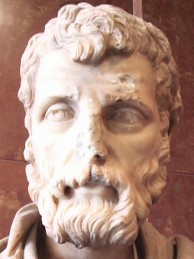Herodes Atticus
Herodes Atticus (c.102-177): Greek orator, one of the representatives of the Second Sophistic.

Herodes Atticus was living in the past. Under the Roman empire, many Greeks felt that their culture was very special, and they hated the fact that they were powerless. The only way to cope with their own irrelevance was to exaggerate the Greek past. People like Herodes Atticus, the richest man in Athens, took to the stage, where they delivered speeches on famous historical subjects: "Leonidas inspires his men to fight until death", "Wounded Athenian soldiers ask their comrades to kill them", or "Pericles asks the Athenians to declare war on Sparta". It was a celebration of a great past.
This cultural activity is sometimes called the Second Sophistic, and Herodes Atticus was considered to be the greatest of these orators by the main ancient author about this phenomenon, Philostratus.
Almost none of his speeches has remained, which is disappointing because of his immense cultural influence. Herodes Atticus was buried in a stadium east of Athens that has been reconstructed for the 1896 Olympic Games and is still a monument in Athens. He also built the odeon near the Acropolis and was among the greatest mecenasses of his age.
Among is villas were the Triopion near the Via Appia (Rome) and a country mansion on the Peloponnese, which he decorated with the original monument of the soldiers fallen at Marathon. He was consul in 143.